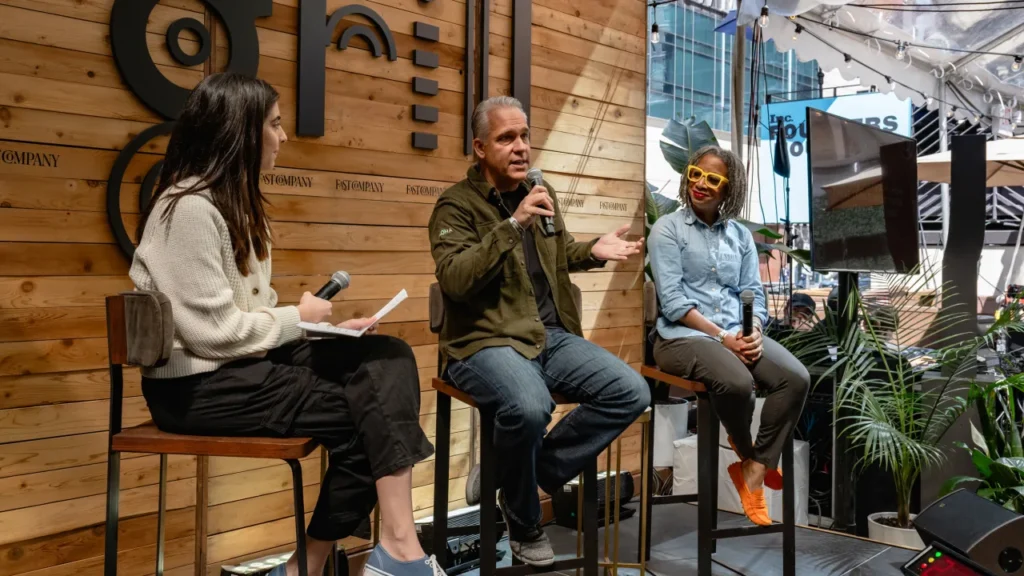
Within three months of becoming CEO of the Honest Company in 2023, Carla Vernón slashed 25% of its eco-friendly goods. That seems tame in comparison to what happened when Brad Charron joined Aloha as CEO in 2017: He killed off every product category.
Now on the other side of major rebrands and company pivots, these CEOs say there wasn’t necessarily a playbook to follow when they joined their respective companies as outsiders. While assuming the role of turnaround CEO proved difficult—and not a role either would like to undertake again—there are many lessons learned, which they shared during a discussion at the Fast Company Grill at SXSW.
When Charron was initially approached about becoming chief marketing officer of Aloha, he was unimpressed with the product lineup, and after about an hour meeting with the team, he concluded that the organic, plant-based food company wouldn’t be in business a year from then. He ultimately decided to join Aloha as CEO, giving himself a made-up title of “re-founder,” and initiated a company restart—getting rid of all the existing products that included trail mix and chocolates and launching Aloha’s current lineup of protein bars, powders, and drinks.
“It was a complete destruction because that was what was needed,” Charron told the SXSW audience. “You couldn’t step-change your way to fixing all that illed it.”
While Vernón’s changes at Honest were less drastic, she had the added pressure of overseeing a publicly traded company: “Wall Street gave me no grace.” Honest had gone public less than two years before she arrived; and when still private, it had experimented with launching products in a wide variety of categories, she said.
One of her first tasks as CEO was to evaluate the entire range of Honest products—from the core or “hero” products, beloved by consumers, to those with varying success by financial metrics, and everything in between. In the end, 25% of the products were slashed.
“People think that’s risky, but our company grew revenues for the first time in two years when we had less variety in our portfolio because we could focus on what mattered and what was good,” she said. “Product quality is your number-one focus.”
EMPOWERING EMPLOYEES
Empowering employees to have a sense of ownership at both Honest and Aloha was also key to both of these turnaround success stories.
“There is more scrutiny and skepticism of the outsider, both from the employee base and from the investor base, who has to figure out whether they can trust you managing their money,” Vernón said. “One of the things I introduced is that every single full-time employee—I don’t care if that is the office mom or the CFO—are all shareholders, and so they are all invested in us figuring out how to be aligned with our retail partners and with our investors.”
Charron likewise focused on ensuring employees felt a sense of ownership in Aloha.
“The most precious thing we have in the world is our time, and there’s nothing worse than wasting your energy and your heart and your soul on something that’s not symmetrically set up for a future success,” he said. “I had to find people who would be willing to kind of put their skin on the line a little bit and [have] an employee-owner mentality.”
NAVIGATING DIFFICULTY
Even though he came into a situation he knew would be difficult—and it proved to be—Charron said it was important to recognize that fixing so much that was broken wouldn’t happen quickly.
“Everything across the entire ecosystem of the company needed to be questioned, and we needed to have patience that eventually we were going to build something that was going to work,” he said. “That’s really kind of the core discipline that has gotten Aloha to where it is today.”
Vernón had more time pressure to enact a pivot—her first earnings call was eight weeks after she became CEO—and she needed the buy-in of the board of directors and investors. While she said working at Honest has been “the thrill and adventure of a lifetime,” there were some “tough” days early on, and that’s when she leaned on her support network.
“It was a very, I think, fragile moment for us as a company, and I am so proud that we’ve come through actually stronger.”
